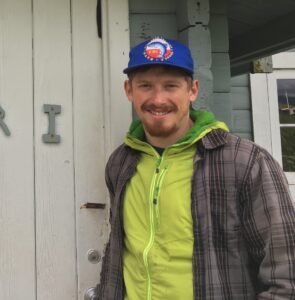 Jeff is primarily interested in the opportunities (and costs) that heterogeneous landscapes confer to animal populations, particularly with respect to aquatic ecosystems across multiple spatial and temporal scales. Jeff aims to connect ecological theory with applied science to develop tractable management strategies that ensure the long-term conservation of ecologically, culturally, and economically valuable species. The focus of Jeff’s dissertation is intentionally broad, combining multiple studies of Snake River cutthroat trout in northwestern Wyoming. Jeff uses observational field studies, statistical modeling techniques, and genomic tools to investigate large-scale population dynamics and eco-evolutionary processes.
Jeff is primarily interested in the opportunities (and costs) that heterogeneous landscapes confer to animal populations, particularly with respect to aquatic ecosystems across multiple spatial and temporal scales. Jeff aims to connect ecological theory with applied science to develop tractable management strategies that ensure the long-term conservation of ecologically, culturally, and economically valuable species. The focus of Jeff’s dissertation is intentionally broad, combining multiple studies of Snake River cutthroat trout in northwestern Wyoming. Jeff uses observational field studies, statistical modeling techniques, and genomic tools to investigate large-scale population dynamics and eco-evolutionary processes.
Jeff received a B.Sc. in Aquatic and Fishery Sciences with minors in Quantitative Sciences and Marine Biology from the University of Washington (2014). While an undergrad, he explored his ecological interests through field-based programs in the San Juan Islands, WA, Caribbean Panama, and as a technician for environmental NGOs. Post-graduation as a Biologist with the Alaska Salmon Program (UW), Jeff managed a remote research station in Chignik, Alaska where and he and his crew maintained long-term datasets that were used to guide the sustainable management of multi-species commercial and subsistence fisheries. During this time, he and collaborators conducted novel research investigating the opportunities landscape complexity and heterogeneity affords salmonid populations. He also worked briefly as a technician in rural Ecuador (Cornell & CSU), where he assisted with research on how local adaptation along elevational and latitudinal gradients drives vulnerability to climate change.
Outside of science, Jeff develops his understanding and respect of the natural world though rock climbing, backcountry skiing, fly fishing, mountain biking, and whitewater rafting.
Professional Preparation and Appointments
Education
- 2014: B.S. Aquatic & Fishery Sciences, University of Washington, Seattle, WA
- 2013: Field Program in Tropical Island Biodiversity Studies, The School for Field Studies, Bocas del Toro, Panama
- 2012: Field Program in Ecology and Conservation of Marine Birds and Mammals, Friday Harbor Laboratories, WA
Professional Appointments
- 2015-2018: Field Biologist, Alaska Salmon Program, University of Washington
- 2016: Field Technician, EVOTRAC, Cornell/Universidad de San Francisco en Quito
- 2014-2015: Research Technician, Alaska Salmon Program, University of Washington
- 2013: Restoration Technician, Northwest Stream Center, Adopt a Stream Foundation
- 2012-2013: Aquaculture Technician, Zebrafish Genetics Lab, University of Washington
Publications
Peer Reviewed
Walsworth, TE, JR Baldock, DE Schindler, & CE Zimmerman (2020). Interaction between watershed features and climate forcing affects habitat profitability for juvenile salmonids. Ecosphere 11(10): e03266.
Baldock, JR, JB Armstrong, DE Schindler, & JL Carter (2016). Juvenile coho salmon track a seasonally shifting thermal mosaic across a river floodplain. Freshwater Biology 61:1454-1465.
Technical Reports
Baldock JR, Walters A, & Al-Chokhacy R (2020). Evaluating the use of redd counts in monitoring the status and trends of Snake River cutthroat trout in spring-fed tributaries of the upper Snake River watershed. Prepared for the Wyoming Game and Fish Department, Wyoming Wildlife and Natural Resource Trust, and relevant landowners
Baldock, JR & DE Schindler (2018). Black Lake natural habitat change: Annual report on lake surface elevation, Alec River discharge, and Black River cross- section monitoring. Prepared for the Chignik Regional Aquaculture Association.
Baldock, JR, TE Walsworth, & DE Schindler (2017). Black Lake natural habitat change: Annual report on lake surface elevation, Alec River discharge, and Black River cross- section monitoring. Prepared for the Chignik Regional Aquaculture Association.
Baldock, JR, TE Walsworth, & DE Schindler (2016). Alaska Salmon Program: Chignik Lakes watershed annual report. University of Washington.
Scholarships & Fellowships
- 2020. Western Ecosystems Technology Research Award for Quantitative Analysis in Wildlife and Fisheries Ecology ($3,000)
- 2020. Vern Bressler Fisheries Fund Scholarship ($1,200)
- 2019. Jackson Hole One Fly Foundation – Research Grant ($37,368)
- 2019. Lyman and Margie McDonald Research Awards for Quantitative Analysis in Wildlife and Fisheries Ecology ($6,000)
- 2019 Jackson Hole One Fly – Dennis Anderson Memorial Scholarship ($4,000)
- 2014. Mary Gates Research Fellowship, University of Washington ($2,000)
- 2014. Thomas and Mary Peck Scholarship ($1,500)
- 2013. Galen and Helen Maxfield Endowed Fisheries Scholarship ($1,500)
- 2012. H.M. Keeler Lake Washington Fund in Fisheries Scholarship ($1,000)
